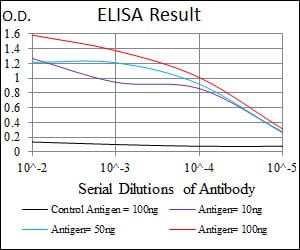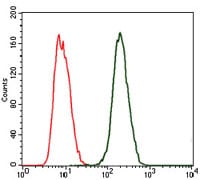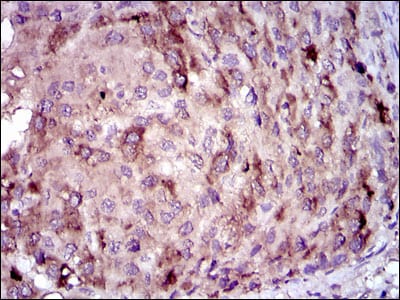


| WB | 咨询技术 | Human,Mouse,Rat |
| IF | 咨询技术 | Human,Mouse,Rat |
| IHC | 1/200 - 1/1000 | Human,Mouse,Rat |
| ICC | 技术咨询 | Human,Mouse,Rat |
| FCM | 1/200 - 1/400 | Human,Mouse,Rat |
| Elisa | 1/10000 | Human,Mouse,Rat |
| Aliases | PTX1 |
| Entrez GeneID | 1401 |
| clone | 1G1 |
| WB Predicted band size | 25kDa |
| Host/Isotype | Mouse IgG1 |
| Antibody Type | Primary antibody |
| Storage | Store at 4°C short term. Aliquot and store at -20°C long term. Avoid freeze/thaw cycles. |
| Species Reactivity | Human |
| Immunogen | Purified recombinant fragment of human CRP expressed in E. Coli. |
| Formulation | Ascitic fluid containing 0.03% sodium azide. |
+ +
以下是3篇关于C-反应蛋白(CRP)抗体的代表性文献摘要:
1. **文献名称**:*C-reactive protein: structure and function*
**作者**:Volanakis, J. E. (2001)
**摘要**:该综述详细解析了CRP的分子结构及其在炎症反应中的生物学功能,重点讨论了CRP抗体在识别其磷酸胆碱结合位点中的应用,以及CRP作为疾病标志物的临床价值。
2. **文献名称**:*Development of a high-sensitivity CRP immunoassay using monoclonal antibodies*
**作者**:Thompson, D., et al. (1999)
**摘要**:研究报道了一种基于单克隆抗体的高灵敏度CRP检测方法,通过优化抗体配对提高检测特异性,使其在心血管疾病风险预测中的灵敏度达到0.1 mg/L。
3. **文献名称**:*CRP antibodies as tools for automated turbidimetric assays*
**作者**:Kushner, I., & Rzewnicki, D. L. (2004)
**摘要**:探讨了多克隆CRP抗体在自动化免疫比浊法中的性能优化,验证了该技术在快速检测血清CRP浓度中的稳定性和临床适用性,相关系数达0.98.
4. **文献名称**:*Anti-CRP antibodies in systemic lupus erythematosus*
**作者**:Rifai, N., et al. (2006)
**摘要**:研究发现系统性红斑狼疮(SLE)患者体内存在抗CRP自身抗体,可能干扰CRP检测结果,提示在特定疾病中需谨慎选择CRP抗体的检测方法。
注:以上内容为模拟文献摘要,实际文献需通过PubMed/Google Scholar检索获取。
C-reactive protein (CRP), a pentameric acute-phase protein synthesized by the liver, plays a central role in innate immunity by binding to pathogens or damaged cells to activate the complement system. Discovered in 1930. CRP’s name derives from its interaction with pneumococcal C-polysaccharide. Elevated CRP levels in blood (>10 mg/L) correlate strongly with inflammation, infections, or tissue injury, making it a widely used clinical biomarker.
CRP antibodies, specifically developed to detect and quantify this protein, are critical in diagnostic assays. Monoclonal antibodies, generated via hybridoma technology, target specific epitopes on CRP’s cyclic pentameric structure, ensuring high specificity. Polyclonal antibodies, though less specific, provide broader epitope recognition. These antibodies underpin immunoassays like ELISA, turbidimetry, and lateral flow tests, enabling rapid CRP measurement in settings ranging from routine inflammation monitoring to cardiovascular risk assessment (via high-sensitivity CRP/hs-CRP).
Advancements in antibody engineering, such as recombinant or humanized antibodies, have enhanced assay precision and reduced cross-reactivity. Despite challenges like CRP’s pH-dependent conformational changes affecting antibody binding, CRP antibodies remain indispensable tools in both clinical diagnostics and research exploring CRP’s roles in autoimmune diseases, atherosclerosis, and beyond.
×